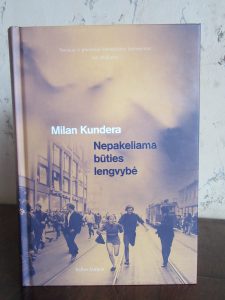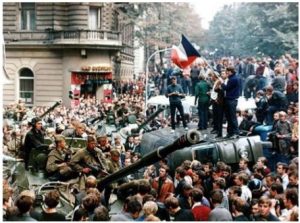Want to cut to the chase? For Summary on Milan Kundera Book “The Unbearable Lightness of Being book” Click Here.
How Milan Kundera ended up in my reading list?

Unbearable Lightness of Being (in Lithuanian)
Years ago I dated this super smart girl who loved getting lost in books. She, among Plato, Kafka and Camus, recommended I started with Milan Kundera. So around 3-4 years ago I read “Immortality” by Milan Kundera. I honestly only remember two things from the book:
- The plot of “Immortality” was inspired my woman’s light hand gesture.
- Milan Kundera sure has a unique style of writing.
And perhaps a year ago I heard of apparently even more famous book by him called The Unbearable Lightness of Being and added to my reading list. And today I want to summarize key points about this book.
What’s so unique about Kundera’s writing?
Direct talking to reader
At times the writer is talking to reader directly. For several brief moments during the reading Milan talks about his characters creation process, debates and even speculates what thoughts one or another character might had been having at some situation. I suspect this technique conversely to common sense let Kundera immerse his readers even more into the characters lives and to really feel where are they coming from.
Character development through narrative
Another thing that really stands out is a small number of dialogues. This is in no way a disappointment. Milan Kundera carefully crafts his characters through narrative telling a reader all kinds of stories from their childhood, likes and dislikes, preferential differences between characters and explaining them etc. Again – this method builds a very strong foundation of fictional character to the point you think you are reading about a real person that lived.
Jumping around the plot
Milan often takes huge leaps in the plot. From one character’s childhood to another character’s preferences. From Czechoslovakia to Zurich and from Stalin’s Son embarrassing death to Nietzsche’s sympathy for beaten horse to name a few. Now as I Generalist I really loved this, because it only emphasizes the point that everything is connected and to really tell the proper story you have to tell a number of elements it is built upon.
For the same reason the first half of the book might seem unattractive and not worthy of your time, but at a certain point you tip and fall in love with the characters and their individual stories.
The Plot
 Tom is a highly respected surgeon in ~1960 Prague. He is a great pickup artist of the time and has an active sex life. Six coincidences lead him to his new love Tereza, who came from little town, conservative family and has a tough time dealing with Tom’s cheating. As mentioned above plot focus from time to time shifts onto another relationship between Sabina (former Tom’s lover) and Franz. There’s also a Tom’s and Tereza’s pet-dog Karenin, who plays quite a significant role in the end.
Tom is a highly respected surgeon in ~1960 Prague. He is a great pickup artist of the time and has an active sex life. Six coincidences lead him to his new love Tereza, who came from little town, conservative family and has a tough time dealing with Tom’s cheating. As mentioned above plot focus from time to time shifts onto another relationship between Sabina (former Tom’s lover) and Franz. There’s also a Tom’s and Tereza’s pet-dog Karenin, who plays quite a significant role in the end.
The plot spans before and during the Soviet invasion of Czechoslovakia and Milan Kundera paints a really vivid painting of what life was about during those horrific times. Kundera’s characters being of higher status, face the uncertainties between fleeing, giving up their values and publicly committing to Soviet lies or giving up surgeon’s career to wash windows in Tom’s case. Dramatic time line helps Kundera to squeeze the most of his characters.
The Power of Abstraction
 A true strength of this book is going after and into the depth of a specific detail of character trait or their minimal action to which Milan Kundera pays great attention. “Why something had to be done in that specific way?” – sorta thing. Out of this analysis comes general conclusions (abstractions) about the way people think, behave – a true mark of observer.
A true strength of this book is going after and into the depth of a specific detail of character trait or their minimal action to which Milan Kundera pays great attention. “Why something had to be done in that specific way?” – sorta thing. Out of this analysis comes general conclusions (abstractions) about the way people think, behave – a true mark of observer.
Philosophy behind The Unbearable Lightness of Being
I could not tell better than John Hansen quoted in wiki article on the book about the title and philosophy examined in the book.
Challenging Friedrich Nietzsche’s concept of eternal recurrence (the idea that the universe and its events have already occurred and will recur ad infinitum), the story’s thematic meditations posit the alternative: that each person has only one life to live and that which occurs in life occurs only once and never again – thus the “lightness” of being. Moreover, this lightness also signifies freedom; Tomáš and Sabina display this lightness, whereas Tereza’s character is “weighed down”. In the Constance Garnett translation of Tolstoy’s “War and Peace” she gives us the phrase “strange lightness of being” during the description of Prince Andrey’s death. In contrast, the concept of eternal recurrence imposes a “heaviness” on life and the decisions that are made – to borrow from Nietzsche’s metaphor, it gives them “weight”. Nietzsche believed this heaviness could be either a tremendous burden or great benefit depending on the individual’s perspective.
Quotes from The Unbearable Lightness of Being
The Unbearable Lightness of Being has some really great ideas, of course they are best experienced within the context of the book, but let me give you some of the lines I really had to stop and think about twice.
Strength and heaviness
Unlike Parmenides, Beethoven apparently viewed weight as something positive. Since the German word schwer means both difficult and heavy, Beethoven’s difficult resolution may also be construed as a heavy or weighty resolution. The weighty resolution is at one with the voice of Fate ( Es muss sein! ); necessity, weight, and value are three concepts inextricably bound: only necessity is heavy, and only what is heavy has value.
But deep down she said to herself, Franz may be strong, but his strength is directed outward; when it comes to the people he lives with, the people he loves, he’s weak. Franz’s weakness is called goodness. Franz would never give Sabina orders. He would never command her, as Tomas had, to lay the mirror on the floor and walk back and
forth on it naked. Not that he lacks sensuality; he simply lacks the strength to give orders. There are things that can be accomplished only by violence. Physical love is unthinkable without violence.
Kitsch
the moment someone keeps an eye on what we do, allowances for that eye, and nothing we do is truthful. Having a public, keeping a public in mind, means living in lies.
When the heart speaks, the mind finds it indecent to object. In the realm of kitsch, the dictatorship of the heart reigns supreme.
Kitsch causes two tears to flow in quick succession. The first tear says: How nice to see children running on the grass! The second tear says: How nice to be moved, together with all mankind, by children
running on the grass!It is the second tear that makes kitsch kitsch.
The brotherhood of man on earth will be possible only on a base of kitsch.
In the realm of totalitarian kitsch, all answers are given in advance and preclude any questions. It follows, then, that the true opponent of totalitarian kitsch is the person who asks questions. A question is like a knife that slices through the stage backdrop and gives us a look at what lies hidden behind it. In fact, that was exactly how Sabina had explained the meaning of her paintings to Tereza: on the surface, an intelligible lie; underneath, the unintelligible truth showing through.
Characters
The characters in my novels are my own unrealized possibilities. That is why I am equally fond of them all and equally horrified by them. Each one has crossed a border that I myself have circumvented. It is that crossed border (the border beyond which my own I ends) which attracts me most. For beyond that border begins the secret the novel asks about. The novel is not the author’s confession; it is an investigation of human life in the trap the world has become.
The longing for Paradise is man’s longing not to be man.
Summary
Milan Kundera managed to pack a lot into few hundred pages:
- interesting storyline;
- well developed characters;
- inside story of casual life during Soviet occupation of Czechoslovakia;
- light philosophy with valuable conclusions;
- dream analysis;
It is not a difficult read and yields quite the return on time spent reading it. Along the book’s storyline the movie with the same name was built, but unfortunately I haven’t seen it yet.
I you would also like familiarize yourself with Milan Kundera, here’s an ebook (PDF) I found (right click>save as…):
Milan Kundera – The Unbearable Lightness of Being ebook (PDF)
Milan Kundera "The Unbearable Lightness of Being"
-
Overall value provided
Facts
Title: The Unbearable Lightness of Being
Author: Milan Kundera (Czech Republic)
Genre: Philosophical fiction
Published: 1984
Tell me what you think!
User Review
( vote)If you found this review meaningful, try other book reviews as well.





Leave A Reply